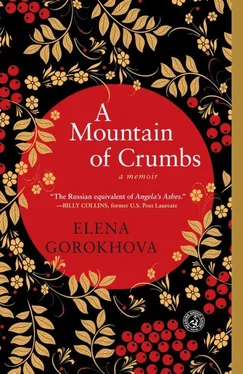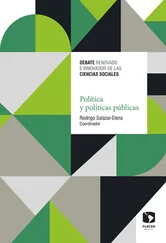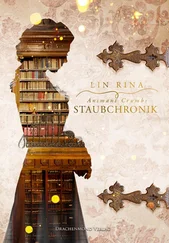I wish Aunt Nina would ask Marina what she wants to be, knowing that if she told the truth my parents already know, everyone would forget about my potatoes—and everyone else’s potatoes, as well as the salted herring and beets with mayonnaise and thin slices of salami beginning to curl up at the edges. Everyone would sit with mouths gaping, wondering how such a stable family—the father the director of a technical school and the mother an anatomy professor—could have produced such an anomaly. At five, you are allowed to want to be a ballerina, or an actress, or a cosmonaut, but at Marina’s age, you are supposed to be serious and think of a real profession, like nursery school teacher, or tram driver, or the local polyclinic doctor in the white hat over suspiciously blond hair who came to our apartment when I had the flu.
“What kind of a profession is acting?” my father wonders when we are home. “Standing onstage, making a fool out of yourself. Gluposti, ” he says, and waves his hand in dismissal—“nothing but silliness.”
“But there were great actors everyone respected,” argues Marina. “Stanislavsky, Nemirovich-Danchenko, Mikhail Chekhov. They even wrote books.”
“Books are good,” says my father out of a cloud of smoke. He is on his second pack of filterless Belomor cigarettes. “But learn how to read and write first. Go to a school where they teach you something useful—how to design an airplane, for example.”
“And what will you do?” chimes in my mother. “Spend your life in some provincial theater so you can come out at the end of the second act to say, Dinner is served? I won’t be able to help you find a job in Leningrad,” she warns, practical as usual. “They’ll send you to Kamchatka, and you’ll be stuck there, with society’s rejects, with sailors and ex-convicts, with those who can barely make it through a plumbing course, wishing you’d listened to what we told you.”
My mother doesn’t understand why anyone would voluntarily engage in such a disorderly and unsafe occupation as acting. First of all, it isn’t serious work. What do you study in drama school, she wonders. Not chemistry, or biology, or even Latin. You don’t contribute to the common good being an actress, she says; you aren’t doing anything solid. It’s all frivolous and chaotic, too unworthy a job for a serious citizen.
“Look at your sister Galya,” adds my mother. Galya is my father’s daughter who is ten years older than Marina and works as a pathologist at Leningrad Hospital No. 2. I don’t know what a pathologist is, but it must be something solid since my mother often uses her as an example. “She has a proper, respectable job. Nine to five-thirty, six days a week.”
On days when Marina is at meetings of her school drama club, my mother rattles the dishes in the sink, lamenting that it’s all the fault of the radio. I prick up my ears, intrigued by the thought that the radio, with its piano banging, morning gymnastics, and solemn three o’clock news could have lured Marina into the trap of acting.
“It was that program,” says my mother, Theatre at the Microphone. When they lived in Ivanovo, before I was born, Marina had spent hours standing in the corner under the radio, constantly punished for riding astride the bar in the back of a streetcar.
She would deliberately climb on when an adult was watching, says my mother, who thought she was punishing Marina. But that was my sister’s plan all along—to end up in the corner, under the radio. All they used to broadcast in the evening were radio plays. She stood there for hours, like a totem pole. My mother could barely tear her away to eat dinner. And now here we are—she wants to be an actress.
I feel a new respect for Marina, for her enviable scheme of reckless streetcar riding in front of adults who would dispense the coveted punishment. I think of her standing under an old-fashioned radio with a wool-covered front, listening to the actors’ voices, imagining them onstage, their eyes gleaming from under layers of greasepaint as they proclaimed eternal love, shed tragic tears, and died.
Then my mother changes her tone and tells my father that they have nothing to worry about. The competition to get into drama school is so fierce that there are a hundred applicants for one seat. “You must be a Sarah Bernhardt,” she insists. “You must have extraordinary connections. You must be related to the minister of culture. No one gets in,” she says and resolutely bangs a lid onto a pot of soup.
THERE IS A DOG in our house, a pedigreed Irish setter the color of copper. He is my sister’s dog, although he couldn’t have appeared in our apartment without my mother’s consent. Both my mother and sister constantly brush the dog’s long curls and let him sit in our armchair so he can look at the grainy images on our TV that flutter behind a thick, water-filled lens. When the dog is in the chair, I climb up next to him and we both watch figure skaters glide across the screen.
The dog’s name is Major, and when it is time to breed him, a man rings our doorbell and introduces himself as Ivan Sergeevich Parfenov, the head of the Leningrad chapter of an organization devoted to Irish setters. Ivan Sergeevich is soft-jowled, just like Major, and somewhere around my mother’s age. As he steps into our hallway, he bows slightly, takes off his felt hat, and hangs it on a hook across from the refrigerator.
“Who is the dog’s owner?” he inquires as my mother shows him into the kitchen, where she is already boiling water for tea.
“Marina!” she yells, and my sister appears from her room, where she was pretending to be busy with calculus problems. She is in her senior year of high school, tenth grade, and her future is set. She is guaranteed acceptance at both my mother’s medical school and my father’s technical institute. She doesn’t need to kill her summer cramming for college entrance exams or tremble at the end of August in front of lists of the accepted, pinned to the dank walls of college hallways. In my mother’s words, the future has been served to her on a silver platter.
To Marina’s surprise, Ivan Sergeevich stands up from his chair and shakes her hand. She is even more startled when he addresses her with the formal pronoun vy reserved for adults and not the casual ty, which is used with children and family members.
He makes small talk about the final exams that are looming in June and asks Marina where she is planning to apply after she graduates from high school.
It is no secret that my sister does not care for either medicine or technology. We all know that what makes her heart melt is standing on the stage of her school’s auditorium, her voice projected and her soul transformed by tragedy from the pages of Chekhov, or Gorky, or some other important playwright whose name I haven’t yet learned.
For a second she hesitates, not knowing if she should reveal the truth in front of this stranger, but Ivan Sergeevich calls her vy one more time and smiles so openly that she glances at my mother and bites her lip. “I want to be an actress,” she says looking at her feet. “I want to apply to drama school.”
My mother, busy pouring boiling water from a kettle into a small porcelain pot filled with tea essence, stops and drills her eyes into Marina, who is still staring at her feet with such concentration that I creep out of the hallway to see if anything extraordinary has attached itself to her slippers.
Ivan Sergeevich becomes agitated, as though this is the best piece of news he has heard in a long time. “I can help you, dear girl,” he exclaims enthusiastically, pressing his hands together in front of his chest as if begging Marina to take advantage of his offer. “I have a wonderful old friend, an actress, who could listen to you read. She can tell you if your talent is suitable for theater. She can advise you on what pieces would work especially well.” He names the actress and Marina stops examining her shoes and looks up. It is a name she has heard many times, first on the radio in the old Ivanovo house, and later in Leningrad, a name attached to a voice that delivers a story every day at three, for which Marina sometimes skips the last period of school.
Читать дальше












